Table of Contents
- 10+ Audit Strategy Templates in PDF | WORD
- 1. Audit Strategy Template
- 2. Internal Audit Strategy
- 3. Audit Strategy Memorandum
- 4. Audit Strategy & Vision
- 5. Audit Strategy & Plan
- 6. Health & Safety Audit Strategy
- 7. Audit Strategy Planning
- 8. Clinical Audit Strategy
- 9. Eucas Audit Strategy
- 10. Cooperative Audit strategy
- 11. Internal Audit Strategy in DOC
- How Will You Prepare the Audit Strategy?
- What are the Considerations on Which the Audit Strategy is Based?
- What is an Audit Engagement?
- What is an Audit Plan?
- What is Included in Audit Planning?
- How Will You Define Internal Audit?
10+ Audit Strategy Templates in PDF | WORD
An audit strategy can be termed as the strategy that gives the direction, timing and scope to the audit plan. It is the guideline that is set based on which the audit plan will work. The audit strategy includes the statement of key decisions that is an extreme requirement to plan the audit process.

10+ Audit Strategy Templates in PDF | WORD
1. Audit Strategy Template
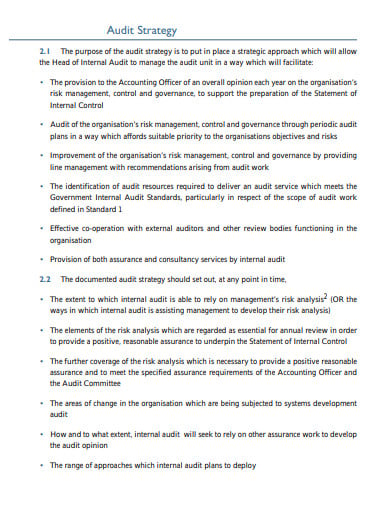 siteresources.worldbank.org
siteresources.worldbank.org2. Internal Audit Strategy
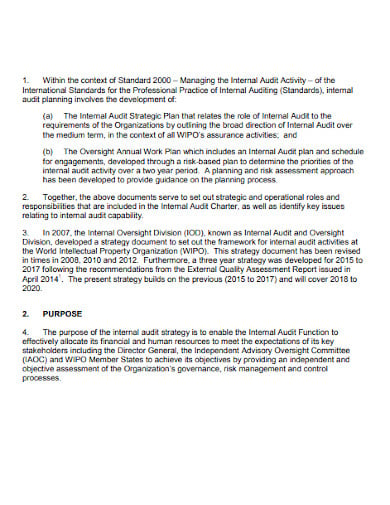 wipo.int
wipo.int3. Audit Strategy Memorandum
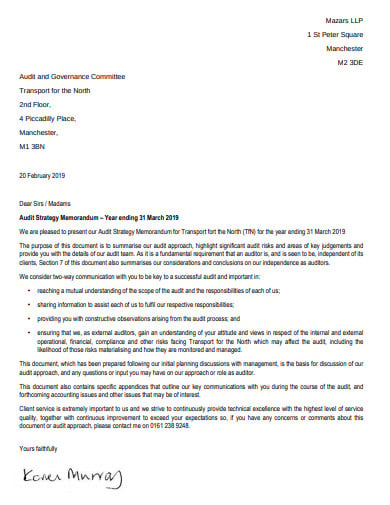 transportforthenorth.com
transportforthenorth.com4. Audit Strategy & Vision
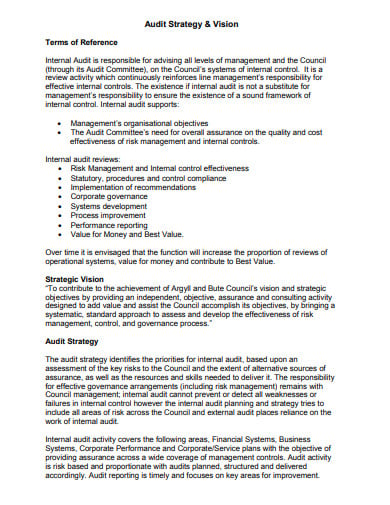 argyll-bute.gov.uk
argyll-bute.gov.uk5. Audit Strategy & Plan
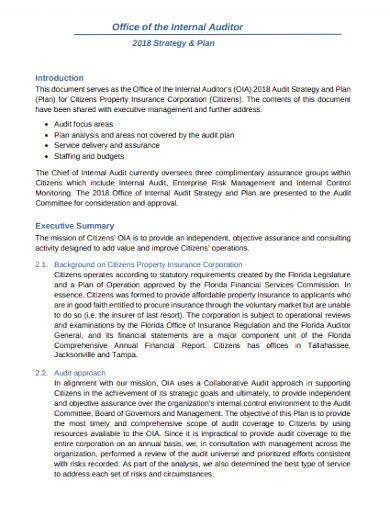 citizensfla.com
citizensfla.com6. Health & Safety Audit Strategy
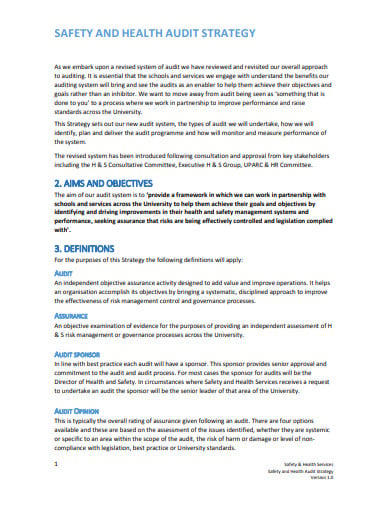 bristol.ac.uk
bristol.ac.uk7. Audit Strategy Planning
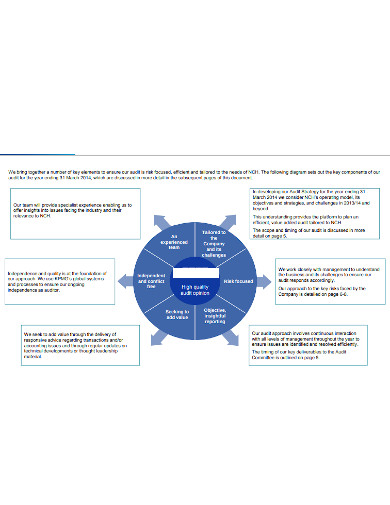 nottinghamcityhomes.org.uk
nottinghamcityhomes.org.uk8. Clinical Audit Strategy
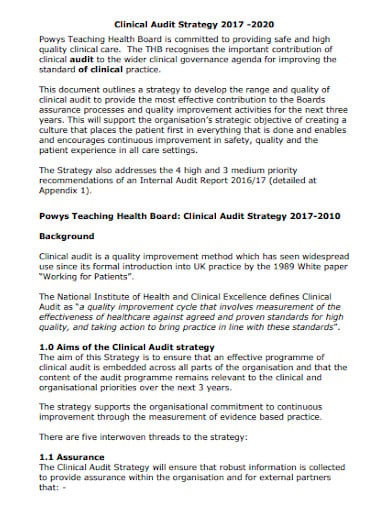 powysthb.wales.nhs.uk
powysthb.wales.nhs.uk9. Eucas Audit Strategy
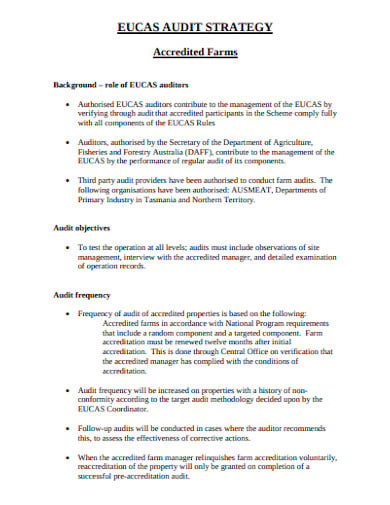 agriculture.gov.au
agriculture.gov.au10. Cooperative Audit strategy
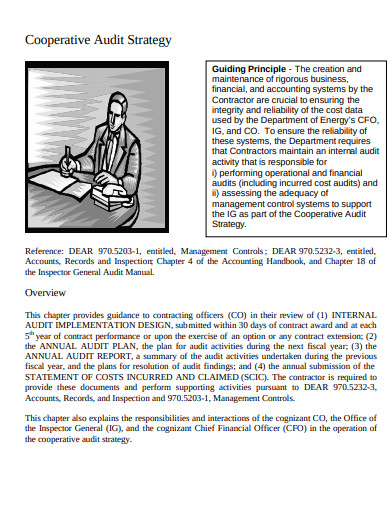 energy.gov
energy.gov11. Internal Audit Strategy in DOC
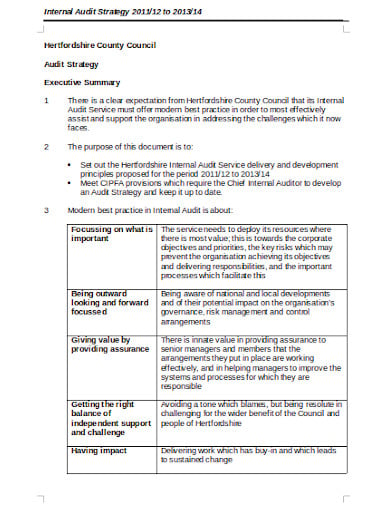 hertfordshire.gov.uk
hertfordshire.gov.ukHow Will You Prepare the Audit Strategy?
Step 1: Understanding the Requirement
To Prepare a proper strategy the first thing that you need to do is to understand the requirement for the audit. In most of the organization, it is a frequent thing that happens every now and then. In some organizations, the audit is conducted to evaluate the operations of the organization. Therefore you need to understand your requirements and set the prioritize.
Step 2: Consult With the Team
In every auditing process, there is a committee known as the audit committee which is responsible for the whole auditing process starting from the initial stage. Therefore a discussion has to happen so that the strategy can be developed unanimously.
Step 3: Decide the Time and Date
These two are a very important part of the audit strategy. Therefore it is extremely important to set the time and date so that the organization or the department that is being audited should be able to prepare for the whole process.
Step 4: Prepare the Audit Plan
The audit plan is part of the audit strategy. Hence prepare the plan that will be the blueprint or the guideline for the process of the audit. The plan should be incorporated into the audit strategy.
Step 5: Names of the Auditors
You have to mention the names of the auditor as part of the audit strategy. The strategy should include the names of the individuals who have been chosen to conduct the whole audit process to evaluate the organization.
What are the Considerations on Which the Audit Strategy is Based?
- The characteristics that are there related to the engagements.
- Reporting the objectives of the audit.
- The time the audit will be conducted.
- The nature of the communications that will be used.
- The significant factors that are there which are related to the efforts of the engagement team.
- The result is derived from the preliminary activities of the engagement.
- The knowledge that is gained and gathered from the author engagements.
- The resources such as nature, timing and the extent that is available for the engagement.
What is an Audit Engagement?
The process of the audit that is conducted by the auditor can be more or less defined as the audit engagement. But more specifically it can be referred to as the initial stage of the auditing process, where the auditor notifies the organization or the department who have requested the audit. This also includes the auditor clarifying that he has understood the scope and purpose.
What is an Audit Plan?
Audit Plan is the procedure that is developed at the beginning of the audit process so that the auditor can focus on the appropriate and important areas and potential problems. The audit plan is formulated as a guide to the whole auditing process and the way the audit will be conducted.
What is Included in Audit Planning?
- The audit planning includes the identification of the risks.
- It includes the designing and the procedures that can be used to address the risk and collect enough and sufficient evidence.
- The planning process helps to keep the cost of the audit reasonable.
- It also helps to avoid misunderstanding.
How Will You Define Internal Audit?
Internal Audit can be defined as the audit that is conducted by the auditors or the audit committee usually comprising of the members of the organization itself. This is the type of audit that takes place by the people within the company providing unbiased and independent reviews and feedbacks.
The objectives of internal audit are to add to the organization’s values and growth and to improve the operations of the organization. The reason an internal audit is conducted is to prepare the organization for external audits and secure the reputation. It can be termed as a mock-evaluation before the external evaluation of the whole organization, its system, functionings, and operations.

